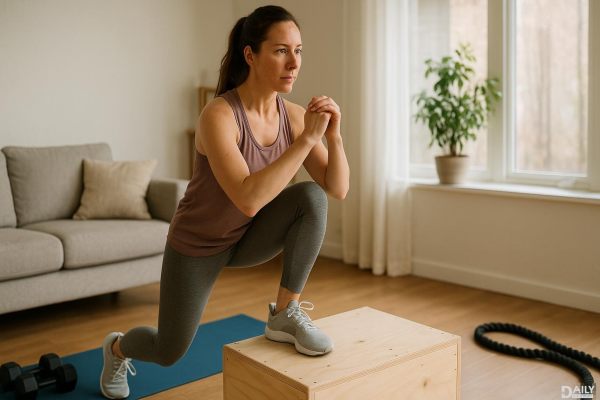For nearly as long as I've been running, I've been saying, "I should lift weights." And although I've run close to 60 races, the number of times I've touched the dumbbells at the gym can be counted on one hand. But with the recent transition to a totally at-home life, I decided now would be as good a time as any to test the waters with weights.
From Runner to Rookie Lifter
I dusted off the dumbbells in the back of my closet, laced up my workout-ready kicks like the UA Charged Breathe TR 2 Training Shoes, and signed up for a virtual Barry's challenge to jump-start my venture into a new sport. In doing so, I was vowing to complete 20 HIIT classes in 30 days. In the month-long program, I opted for all strength-training classes to put me as far out of my comfort zone as possible. Now that I'm officially on the other side of the #SocialFitnessingChallenge, I'm walking away a bit stronger, a bit more toned, and a whole lot more reflective. You see, jumping head first into something I had never tried before gave me a totally different outlook on the sport I know and love as well as fitness in general.
Why Runners Should Lift (Even If They Hate It)
most runners avoid the weight room like it’s the plague. We tell ourselves that logging miles is enough, that our legs are strong from pounding pavement. But here’s the truth: strength training isn’t just for bodybuilders or gym bros. It’s a game-changer for endurance athletes too. Lifting helps prevent injuries by balancing muscle groups, improves running economy (translation: you’ll get faster without feeling like you’re working harder), and even boosts bone density. And no, you won’t suddenly turn into the Hulk—unless you’re eating like one and lifting heavy six days a week.
The Mental Hurdles of Starting Strength Training
Stepping into the world of weights as a runner felt like entering a foreign country where I didn’t speak the language. The first few sessions were humbling—like, "wait, why can’t I do a single push-up properly?" humbling. But that discomfort was part of the process. I had to remind myself that being bad at something is the first step to being kinda good at it. The mental shift from chasing distance to chasing reps was weirdly refreshing. Instead of obsessing over pace, I focused on form. Instead of dreading the next mile, I looked forward to the next set. It was a reset button for my fitness mindset.
What I Learned from 30 Days of Lifting
By the end of the challenge, my relationship with fitness had evolved. I wasn’t just a runner who occasionally did planks—I was someone who could deadlift without embarrassing myself. My core felt more stable, my posture improved, and hills that used to wreck me suddenly felt manageable. But the biggest surprise? I didn’t lose endurance. In fact, my easy runs felt smoother, and my recovery between speed sessions was quicker. And let’s not skip the aesthetic perks—hello, newly defined shoulders and arms that don’t jiggle when I wave.
How to Ease Into Strength Training Without Losing Your Running Mojo
If you’re a cardio junkie considering weights, here’s the good news: you don’t have to choose one over the other. Start with two strength sessions a week, focusing on compound movements like squats, lunges, and rows. Keep the reps moderate (8-12 per set) and the weight challenging but not soul-crushing. Pair lifting days with easy runs or rest days to avoid burnout. And for the love of all things holy, don’t skip the warm-up—your muscles will thank you later. The goal isn’t to become a powerlifter overnight; it’s to build a body that’s resilient enough to keep doing what you love without breaking down.
So here’s my takeaway after a month of trading tempo runs for dumbbells: strength training isn’t the enemy of running—it’s the sidekick you didn’t know you needed. Whether you’re chasing a PR or just trying to stay injury-free, picking up those weights might just be the missing piece in your fitness puzzle. And who knows? You might even enjoy it. (Okay, maybe "enjoy" is a strong word… but you’ll at least appreciate the results.)
























